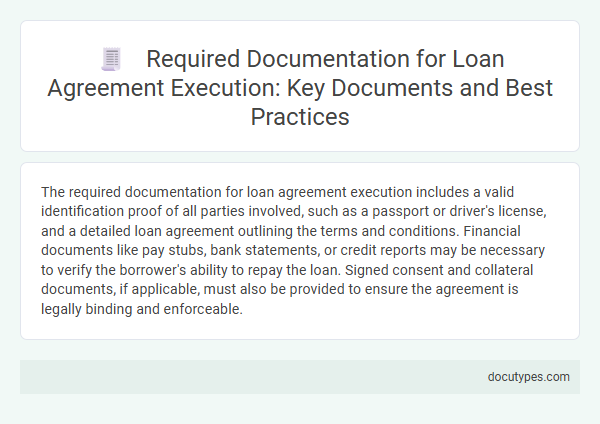The required documentation for loan agreement execution includes a valid identification proof of all parties involved, such as a passport or driver's license, and a detailed loan agreement outlining the terms and conditions. Financial documents like pay stubs, bank statements, or credit reports may be necessary to verify the borrower's ability to repay the loan. Signed consent and collateral documents, if applicable, must also be provided to ensure the agreement is legally binding and enforceable.
Introduction to Loan Agreement Documentation
Loan agreement execution requires specific documentation to ensure legal compliance and clarity between parties. These documents formalize the terms and conditions governing the loan transaction.
Key documents include the loan agreement itself, identification proofs, and financial statements. Collateral-related documents may also be necessary depending on the loan type. Proper documentation safeguards your interests and facilitates smooth loan processing.
Importance of Proper Documentation in Loan Agreements
What is the required documentation for loan agreement execution? Proper documentation ensures clarity on terms and obligations, reducing the risk of disputes between parties. Detailed records provide legal protection and facilitate smooth enforcement of the agreement.
Borrower Identification Requirements
Loan agreement execution requires specific borrower identification documents to verify your identity and ensure compliance with legal standards. Commonly accepted forms include a valid government-issued photo ID such as a passport or driver's license.
Proof of residence may also be necessary, often provided through utility bills or bank statements dated within the last three months. Lenders may request additional documents to confirm your financial standing and maintain transparency during the loan process.
Lender Verification Documents
Lender verification documents are essential for the execution of a loan agreement to ensure the identity and legitimacy of the lender. Commonly required documents include a valid government-issued ID, proof of address, and financial statements confirming the lender's ability to provide the loan. These documents help protect both parties by establishing trust and compliance with regulatory standards.
Detailed Loan Terms and Conditions
Detailed loan terms and conditions are essential for the proper execution of a loan agreement. These terms provide clear guidelines on the rights and obligations of all parties involved.
- Loan Amount and Disbursement - Specifies the principal sum, currency, and schedule of funds release to ensure clarity on financial commitments.
- Interest Rate and Payment Schedule - Defines the applicable interest rate, calculation method, and timeline for repayments to avoid misunderstandings.
- Default and Remedies - Outlines the consequences of non-payment and available legal remedies protecting the lender's interests.
Collateral and Security Documents
Loan agreement execution requires specific documentation to ensure legal and financial protection for all parties. Collateral and security documents play a crucial role in securing the loan and outlining asset details.
Collateral documents include deeds, titles, or liens proving ownership and value of the assets pledged. Security documents establish the lender's rights in case of default and typically involve security agreements or guarantees to safeguard the loan.
Proof of Income and Financial Statements
Required documentation for loan agreement execution primarily includes proof of income and financial statements. Proof of income typically involves recent pay stubs, tax returns, or bank statements verifying the borrower's earnings. Financial statements, such as balance sheets and income statements, provide a comprehensive view of the borrower's financial health and ability to repay the loan.
Legal Compliance and Regulatory Documents
| Required Documentation for Loan Agreement Execution | Details |
|---|---|
| Identification Documents | Government-issued IDs such as passports or driver's licenses ensure legal identity verification for all parties involved. |
| Financial Statements | Recent bank statements, tax returns, and income proofs establish the borrower's financial capacity and creditworthiness. |
| Loan Agreement Draft | A comprehensive document outlining the loan amount, interest rate, repayment schedule, and terms complies with legal standards and provides clarity. |
| Regulatory Approvals | Licenses, permits, or clearances mandated by local financial regulatory authorities must be secured to ensure the loan agreement adheres to applicable laws. |
| Compliance Certificates | Certificates showing adherence to anti-money laundering (AML) policies and Know Your Customer (KYC) regulations are essential for executing a legally compliant loan agreement. |
| Collateral Documents (if applicable) | Legal documentation proving ownership and valuation of collateral assets supports risk mitigation and enforces loan security. |
| Authorization Letters | Documents authorizing representatives to act on behalf of entities ensure that your loan agreement execution meets legal formalities. |
Best Practices for Document Management and Security
Proper documentation is essential for the successful execution of a loan agreement. Ensuring best practices for document management and security protects all parties involved.
- Comprehensive Identification Documents - Accurate borrower and lender identification prevents fraud and ensures legal compliance.
- Secure Digital Storage - Utilizing encrypted cloud services safeguards sensitive loan agreement files from unauthorized access.
- Version Control Systems - Maintaining an audit trail of document revisions supports transparency and accountability during the loan process.
Your diligent management of required loan agreement documentation enhances security and facilitates a smooth transaction.
What Is the Required Documentation for Loan Agreement Execution? Infographic

